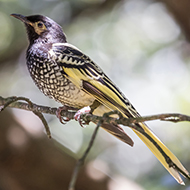
Loss of communication could seriously impact future of the species.
According to new research from The Australian National University (ANU), populations of the critically endangered regent honeyeater are declining so rapidly that the species is losing its 'song culture'.
The regent honeyeater was once abundant in south-eastern Australia, but now just 300 individuals remain in the world. The rarity of adult male regent honeyeaters is seriously impacting the species' ability to communicate with one another, as younger males have no way of learning to sing correctly.
The new study – published in the journal Proceedings of the Royal Society B – found that in places where there were larger numbers of regent honeyeaters, males sang 'rich and complex songs'. However, where the birds were more rare, the males sang more simplified or, in some cases, 'totally incorrect' songs.
"18 male regent honeyeaters - or around 12 per cent of the total population - were only able to copy the songs of other bird species," study co-author Dr Dejan Stojanovic said.
"This lack of ability to communicate with their own species is unprecedented in a wild animal. We can assume that regent honeyeaters are now so rare that some young males never find an older male teacher."
The research team also found that regent honeyeaters born in captivity sing completely different songs to wild birds. They believe that this could reduce the birds' attractiveness to wild birds when they are released; Impacting their ability to find a mate and causing further population decline.
Lead author Dr Ross Crates said: "We've devised a new strategy to teach young captive regent honeyeaters to sing the same song as the wild birds by playing them audio recordings.
"Loss of song culture is a major warning sign the regent honeyeater is on the brink of extinction and we still have a lot to learn about how to help them."



 The latest
The latest